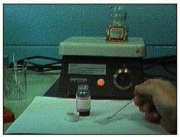Difference between revisions of "Aroclor"
Jump to navigation
Jump to search
| Line 8: | Line 8: | ||
Arachlor (sp) | Arachlor (sp) | ||
| − | == | + | == Risks == |
| − | + | * Highly toxic by ingestion and inhalation. | |
| + | * NIST: [https://www-s.nist.gov/srmors/msds/3079-MSDS.pdf SDS] | ||
| − | + | ==Physical and Chemical Properties== | |
| − | |||
| − | |||
| − | |||
| − | |||
| − | + | * Refractive indices range from 1.640 - 1.670. | |
| − | + | ==Resources and Citations== | |
| − | |||
| − | |||
| − | |||
| − | |||
| − | |||
| − | == | ||
* Thomas Gregory, ''The Condensed Chemical Dictionary'', Reinhold Publishing, New York, 3rd ed., 1942 Comment: p. 108 | * Thomas Gregory, ''The Condensed Chemical Dictionary'', Reinhold Publishing, New York, 3rd ed., 1942 Comment: p. 108 | ||
Latest revision as of 11:49, 29 April 2022
Description
[Monsanto Chemical] A discontinued registered trademark for a series of polychlorinated biphenyl (PCB) compounds. Aroclor was first sold in 1930. It was available as viscous oils and thermoplastic solids with high refractive indices. It was commonly used as a mounting medium for microscope slides. Aroclor is no longer used because of its high toxicity. In fact, two Aroclors (1254 and 1260) were on the list of the 20 most toxic substance in the United States. Aroclor was discontinued in the United States in 1977.
Synonyms and Related Terms
Arachlor (sp)
Risks
- Highly toxic by ingestion and inhalation.
- NIST: SDS
Physical and Chemical Properties
- Refractive indices range from 1.640 - 1.670.
Resources and Citations
- Thomas Gregory, The Condensed Chemical Dictionary, Reinhold Publishing, New York, 3rd ed., 1942 Comment: p. 108
- G.S.Brady, Materials Handbook, McGraw-Hill Book Co., New York, 1971 Comment: p. 392, 1248
- Walter C. McCrone, John Gustave Delly, The Particle Atlas, W. McCrone Associates, Chicago, IV, 1972
